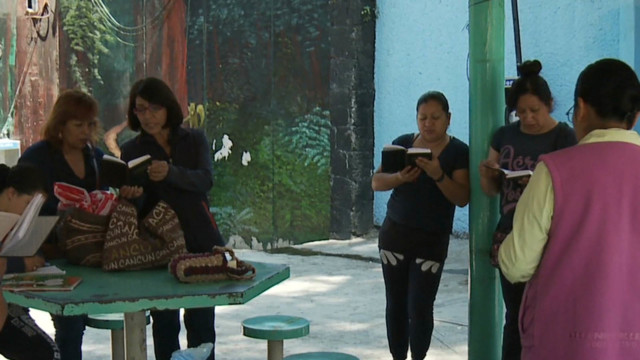In Santa Martha Acatitla women’s prison in Mexico City, where slightly more than 1,400 women are serving sentences for crimes ranging from petty theft to murder. Many are behind bars for drug-related crimes.
CCTV America’s Franc Contreras was given rare access to some of the inmates including Gabriela Diaz Tobar, who was selected to talk by officials of Mexico’s penitentiary system.

Tobar was sentenced to 10 years in prison for attempting to smuggle 700 grams of heroin from Colombia into Mexico. She was hoping to make a couple of thousands of dollars.
“I did it for economic reasons. I am a single mother, and at the time of my arrest both of my parents were ill. They both died while I was here in prison,” Tobar said.
During the first six years behind bars, Tobar was separated from her two boys and never saw them. Now 36, she has one year left to serve.
“Life on the outside is not easy. It was the worst decision that I could have taken in my life. One just cannot measure the consequences,” Tobar said.
A Mexico City-based NGO, Equis, said women jailed for drug crimes often fit a specific profile. The human rights group is calling for criminal justice reform, including decriminalizing small amounts of marijuana as a way to keep mothers and children together.
“What we see in our investigation is that they come from a context of poverty and low education levels. They are women who head households and are responsible not only for their own children, but also have others who depend on them. And they are women with no prior jail sentences,” said Isabel Blas, from Equis Justice for Women NGO.
Under pressure to show results in the war on drugs, Mexican police and military have been arresting an increasing number of women, and there are documented cases in which women have been forced to confess to drug related crimes they did not commit.
Mexican police and military personnel have been known to use torture tactics. In this 2015 video, a federal police officer and a soldier suffocate this 22-year-old woman before obtaining her confession.
Under duress, the woman pleaded guilty to drug charges, including belonging to La Familia drug cartel. She was sent away to a federal prison. Mexican officials later publicly apologized for the abuse.
Since 2006, when former President Felipe Calderon first deployed military forces to fight drug trafficking organizations, reports of torture committed by Mexican security forces have increased dramatically.
A top official with Mexico City’s penitentiary system said he’s not aware of such abuses.
“In the case of Mexico City, I have no knowledge of the existence of abuse by authorities obtaining declarations from individuals who admit their guilt or admit to belonging to a criminal organization,” said Antonio Hazael Ruiz Ortega, undersecretary for Mexico City penitentiary system.
Given these reports, the Mexican public continues to debate how to fight drug crimes in Mexico and whether women are being unnecessarily caught in the middle.
Todd Clear on women in the criminal justice system
To further discuss the issues of women in the criminal justice system, CCTV America’s Asieh Namdar interviewed Rutgers University Criminal Justice Professor Todd Clear.
 CGTN America
CGTN America

